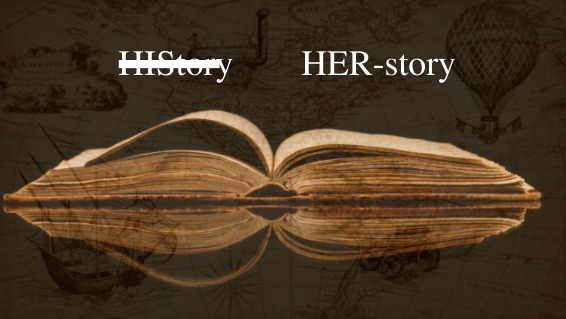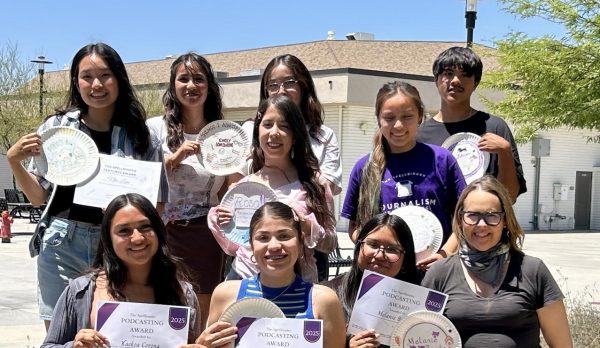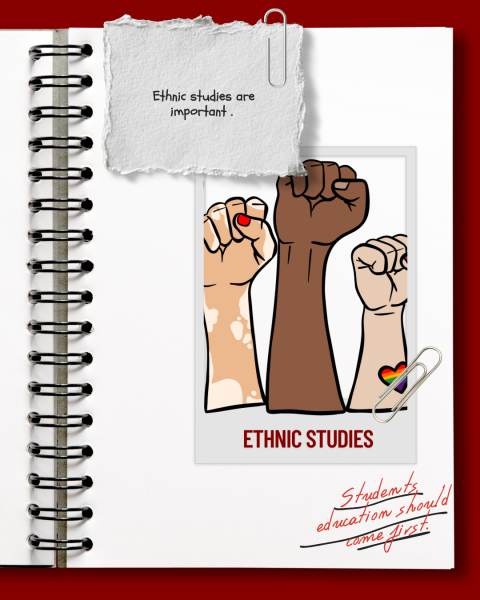History fails to tell the full story, leaving out HER story

Maria Alegria (created with Canva)
History has a male oriented perspective therefore has excluded half of the population, women.
You are in history class and are learning about all these historic men. Men who were inventors, leaders, explorers and more. From Christopher Columbus to the President of the United States. All of this makes history sound more like HIS story than HER story.
Most of history is all about men, about 99%. According to English Heritage, women make up about 0.5% of the history that is recorded. This is outrageous considering that women make up half of the world’s population.
This underrepresentation in history has made women feel a mix of sadness and frustration because women’s history is important history and leaving them out is not the correct way to learn about history.
Deyaneira Garcia-Sanchez, a sociology graduate from Saint Mary’s College Notre Dame, feels that women being left out of history is like muting half of the population.
“I mostly feel frustrated about the erasure of women from history because we are essentially speaking of half of the world’s population being silenced for generations. History is said to be cyclical so if we do not learn from our mistakes we are only left to repeat them,” said Garcia-Sanchez.
Women were not always left out of the history curriculum.
World History teacher, Kathy Van Dusen, said, “Unfortunately learning about women’s history has not been emphasized at the K-12 level. However, things are changing. In the 1980’s and 1990’s a place for gender and women’s history was established, however, there was backlash with the “No Child Left Behind,” policy. As a result, gender and women studies were excluded from the K-12 curriculum.”
Van Dusen explains that about 10 years after the establishment of women’s studies, the educational system made it part of history education but was shortly removed.
If the educational system had made an effort to include it in the past, it should be included again as it is very important. The history of women should be taught to the K-12 students instead of this male-dominated approach.
Junior Sofia Macedo explains that history is taught more as a male subject than of both genders.
“I believe we aren’t taught much history of women because for hundreds of years we’ve been built to recognize and cheer men for their accomplishments…After time you realize how much of women’s history is erased simply because they are women,” said Macedo.
This is the truth for most of the contributions women have made and sometimes men even take the credit.
“..if a woman were to do something she’d be ignored or her idea would be stolen by a man that has taken all credit,” said Macedo.
This was the case for NASA’s Katherine Johnson, Dorothy Vaughan, and Mary Jackson. “They were essential to the early U.S. space program. For example, they were responsible for calculating trajectories for the Apollo 11 mission for decades their work was forgotten,” as mentioned in Thomson Reuters Foundation News.
Women should not be ignored because they are crucial to society. If people are able to learn about their contributions, our society can be taught a complete history and become a more equitable place.
“Learning about women in history is important as it helps us learn who we are. It is important that we learn and understand the challenges our grandmothers, great grandmothers, and mothers faced. It helps build our self-esteem and gives us strength and inspiration to build better lives for ourselves and families in the future,” said Van Dusen.
By learning about the women in our past we can gain a better understanding of the women in our lives and see the full history.
Garcia-Sanchez says we should change the idea of what makes something historic to be more inclusive.
“The best way to make history more inclusive is by changing the narrative of what we believe to be ‘worthy of making history.’ So many times the success, women have reached, is blurred by nuance details (like if she is single or a mother or what she is wearing) instead of focusing on preserving a woman’s legacy as a powerhouse in our society,” said Garcia-Sanchez.
Sometimes the achievements of women are overlooked just because of their appearance or who they are. Historians want to tell a biased point of view and discredit the achievements of these powerful women.
Historians need to be less prejudiced and biased in their history because they are creating an incomplete past, leaving out half of the world.





































